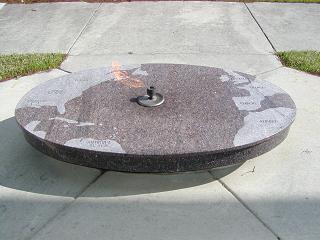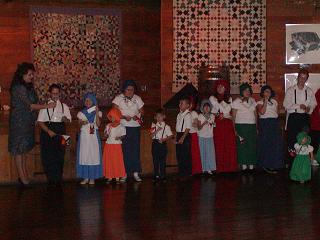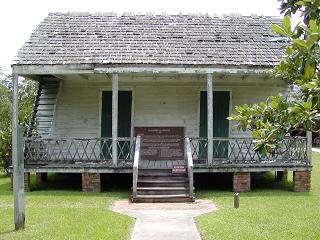 The Southwest Louisiana Express
The Southwest Louisiana Express 
The
Effect of the Americanization of the Cajuns
 "Un people sans
passé est
un people sans future" - A people without a past are a people without a
future; Bernard (2003) concludes his book "The Cajuns: Americanization
of a people" with this quotation from the inscription of the Acadian
Memorial's eternal flame. The Cajun culture is so unique that its
enchantment is well-known not only in the United States but all over
the world, and I was held spellbound by the enchantment. As I
believed that the Cajun culture took root deeply in southwest
Louisiana, it seemed to be eternal. In truth, we can still listen
to great Cajun music, eat delicious Cajun food, and find many signs in
French throughout southwest Louisiana. So an article of The Times
of Acadiana was a great shock to me because Fuller discussed the
problem of the Americanization of the Cajuns in the article. For the
first time, I heard that the Americanization of the Cajuns makes them
feel gloomy about the future. While the Cajuns still appreciate
their own culture, the Americanization of the Cajuns has had a major
effect on the Cajun life, the awareness of the ethnicity of the Cajuns
and the use of the French language in Louisiana.
"Un people sans
passé est
un people sans future" - A people without a past are a people without a
future; Bernard (2003) concludes his book "The Cajuns: Americanization
of a people" with this quotation from the inscription of the Acadian
Memorial's eternal flame. The Cajun culture is so unique that its
enchantment is well-known not only in the United States but all over
the world, and I was held spellbound by the enchantment. As I
believed that the Cajun culture took root deeply in southwest
Louisiana, it seemed to be eternal. In truth, we can still listen
to great Cajun music, eat delicious Cajun food, and find many signs in
French throughout southwest Louisiana. So an article of The Times
of Acadiana was a great shock to me because Fuller discussed the
problem of the Americanization of the Cajuns in the article. For the
first time, I heard that the Americanization of the Cajuns makes them
feel gloomy about the future. While the Cajuns still appreciate
their own culture, the Americanization of the Cajuns has had a major
effect on the Cajun life, the awareness of the ethnicity of the Cajuns
and the use of the French language in Louisiana. First, a big effect of the
Americanization of the Cajuns is the change of the Cajun life.
Because the original Cajun lifestyle has declined, there are few
differences in the lifestyle between the Cajuns and Americans
today. The Cajuns had traditional social institutions particular
to them such as "boucheries", "bal de maison" and "coups de main"
(Ancelet, Edwards & Pitre, 1991). These institutions were
fundamental to their society which consisted of occupations such as
farming, ranching, fishing, trapping, instrument making, and fiber
crafts, and these activities were based on the cooperation among the
family members and neighbors (Ancelet et al). However, as the
society in the United States became modernized after World War II, they
could not help abandoning original institutions to survive in the
modern world. Consequently, although some lifestyles are still
alive, e.g. fishing, family crawfish boil and gumbo (Bernard, 2003),
the original Cajun life has declined, and the family values also have
changed. However, the Cajuns, who felt apprehensive about the
decline in their own culture, launched the renaissance of the original
Cajun culture. The cultural institutions in Lafayette, such as
Acadian Village and Vermilionville, hold many events, lectures and
workshops, which propagate the original Cajun culture, through the
year. Festivals like Festival Acadiens and non-profit
organizations such as Louisiana Folk Roots also take part in the
preservation of the original Cajun culture. Moreover, tourism
turns its efforts to feature the original Cajun culture. Tourism
is the most important industry in southwest Louisiana. Although
tourism sometimes distorts the true colors, it plays a big role in the
preservation of the original Cajun culture. Thus, the
Americanization of the Cajuns has changed the Cajun lifestyle, but the
recent renaissance contributes to the preservation of the original
Cajun culture.
First, a big effect of the
Americanization of the Cajuns is the change of the Cajun life.
Because the original Cajun lifestyle has declined, there are few
differences in the lifestyle between the Cajuns and Americans
today. The Cajuns had traditional social institutions particular
to them such as "boucheries", "bal de maison" and "coups de main"
(Ancelet, Edwards & Pitre, 1991). These institutions were
fundamental to their society which consisted of occupations such as
farming, ranching, fishing, trapping, instrument making, and fiber
crafts, and these activities were based on the cooperation among the
family members and neighbors (Ancelet et al). However, as the
society in the United States became modernized after World War II, they
could not help abandoning original institutions to survive in the
modern world. Consequently, although some lifestyles are still
alive, e.g. fishing, family crawfish boil and gumbo (Bernard, 2003),
the original Cajun life has declined, and the family values also have
changed. However, the Cajuns, who felt apprehensive about the
decline in their own culture, launched the renaissance of the original
Cajun culture. The cultural institutions in Lafayette, such as
Acadian Village and Vermilionville, hold many events, lectures and
workshops, which propagate the original Cajun culture, through the
year. Festivals like Festival Acadiens and non-profit
organizations such as Louisiana Folk Roots also take part in the
preservation of the original Cajun culture. Moreover, tourism
turns its efforts to feature the original Cajun culture. Tourism
is the most important industry in southwest Louisiana. Although
tourism sometimes distorts the true colors, it plays a big role in the
preservation of the original Cajun culture. Thus, the
Americanization of the Cajuns has changed the Cajun lifestyle, but the
recent renaissance contributes to the preservation of the original
Cajun culture. Second, the awareness of the
ethnicity of the Cajuns is decreasing rapidly. The population of
the Cajuns is decreasing. This is caused by the decreasing
awareness of the ethnicity of the Cajuns. "The 1990 census
counted more than four hundred thousand Cajuns in Louisiana, while the
2000 census counted only about forty thousand, roughly a 90 percent
decline in only ten years" (Bernard, 2003, p. xxiii). However,
since 40 percent of Irish ancestors, 38 percent of German ancestors and
32 percent of French ancestors also declined (Fuller, 2003), this
phenomenon is true for not only the Cajuns but other ethnic
groups. Cajun was included as a choice on the form of the 1990
census, but not on the form of the 2000 census (Fuller).
Therefore, the data of the censuses may be uncertain because of the
obscure criterion, but the fact that the decreasing awareness of the
ethnicity of the Cajuns yielded such results of the censuses describes
the Americanization of the Cajuns. Meanwhile, some Cajuns are
casting a new light on their identity, and many Cajuns are proud of
their identity. Fuller discusses this problem in The Times of
Acadiana in April 2003, and he notices two recent books, which describe
the identity of the Cajuns and inspire the Cajuns to be aware their
ethnicity. One of the two books is Bernard's "The Cajuns:
Americanization of a people", which describes the Americanization of
the Cajuns best. Furthermore, many Cajuns teach us their merits
in our daily life. For example, one Cajun teaches me how to cook
good crawfish etoufee at dinner, and the other teaches me Cajun
songs and Cajun French at jam sessions. I have many other
opportunities to learn Cajun culture from the Cajuns. They
proudly tell me about the identity of the Cajuns with jokes. The
Americanization of the Cajuns has caused the decline in the awareness
of the ethnicity of the Cajuns, but some Cajuns work on the problem in
recent magazines and books, and others proudly keep the awareness of
the ethnicity of the Cajuns.
Second, the awareness of the
ethnicity of the Cajuns is decreasing rapidly. The population of
the Cajuns is decreasing. This is caused by the decreasing
awareness of the ethnicity of the Cajuns. "The 1990 census
counted more than four hundred thousand Cajuns in Louisiana, while the
2000 census counted only about forty thousand, roughly a 90 percent
decline in only ten years" (Bernard, 2003, p. xxiii). However,
since 40 percent of Irish ancestors, 38 percent of German ancestors and
32 percent of French ancestors also declined (Fuller, 2003), this
phenomenon is true for not only the Cajuns but other ethnic
groups. Cajun was included as a choice on the form of the 1990
census, but not on the form of the 2000 census (Fuller).
Therefore, the data of the censuses may be uncertain because of the
obscure criterion, but the fact that the decreasing awareness of the
ethnicity of the Cajuns yielded such results of the censuses describes
the Americanization of the Cajuns. Meanwhile, some Cajuns are
casting a new light on their identity, and many Cajuns are proud of
their identity. Fuller discusses this problem in The Times of
Acadiana in April 2003, and he notices two recent books, which describe
the identity of the Cajuns and inspire the Cajuns to be aware their
ethnicity. One of the two books is Bernard's "The Cajuns:
Americanization of a people", which describes the Americanization of
the Cajuns best. Furthermore, many Cajuns teach us their merits
in our daily life. For example, one Cajun teaches me how to cook
good crawfish etoufee at dinner, and the other teaches me Cajun
songs and Cajun French at jam sessions. I have many other
opportunities to learn Cajun culture from the Cajuns. They
proudly tell me about the identity of the Cajuns with jokes. The
Americanization of the Cajuns has caused the decline in the awareness
of the ethnicity of the Cajuns, but some Cajuns work on the problem in
recent magazines and books, and others proudly keep the awareness of
the ethnicity of the Cajuns. The most remarkable effect of the
Americanization of the Cajuns is the decline in the use of the French
language in Louisiana. The French language is the most important
component of Cajun culture, and Bernard (2003) represents Cajun French
as "source of our identity". However, the number of French
speakers and learners in Louisiana is decreasing, and moreover even the
pronunciation of French names is Americanized, e.g. BER-NARD, not
BEAR-NAH (Bernard). Especially the decreasing of the number of
young French speakers and learners is a serious worry. Although
sociologists indicate that the French language needs the critical mass
of 20 percent of speakers in order to survive linguistically, only 3
percent of the Cajuns who were born after 1980 speak French as the
first language, and this represents a 95 percent decline from the World
War II era (Bernard). Therefore, the activities which aim to
preserve the use of the French language in Louisiana are vigorous among
the Cajuns. The Council for the Development of French in
Louisiana (CODFIL) has strived to restore the use of the French
language in Louisiana since 1968. At first, CODFIL was engaged in
the development of French, but only standard French, but now its
mission is based on the regional affairs in Louisiana, and it expands
its mission into business and culture. The public radio station,
KRVS, and the local TV station, AOC, broadcast in French, and their
programs are popular among the Cajuns. Not only veteran but young
musicians try to sing Cajun songs in French. Although standard
French is taught in school, interestingly Cajun French is taught at ULL
and in workshops. The Americanization of the Cajuns has caused
the decline in the use of the French language, and the French language
of Louisiana seems to survive only in Cajun music, Cajun food and
signs, but earnest efforts such as the activities of CODFIL break new
ground where the French language survives, and they are working hard on
propagation of the use of the French language in Louisiana.
The most remarkable effect of the
Americanization of the Cajuns is the decline in the use of the French
language in Louisiana. The French language is the most important
component of Cajun culture, and Bernard (2003) represents Cajun French
as "source of our identity". However, the number of French
speakers and learners in Louisiana is decreasing, and moreover even the
pronunciation of French names is Americanized, e.g. BER-NARD, not
BEAR-NAH (Bernard). Especially the decreasing of the number of
young French speakers and learners is a serious worry. Although
sociologists indicate that the French language needs the critical mass
of 20 percent of speakers in order to survive linguistically, only 3
percent of the Cajuns who were born after 1980 speak French as the
first language, and this represents a 95 percent decline from the World
War II era (Bernard). Therefore, the activities which aim to
preserve the use of the French language in Louisiana are vigorous among
the Cajuns. The Council for the Development of French in
Louisiana (CODFIL) has strived to restore the use of the French
language in Louisiana since 1968. At first, CODFIL was engaged in
the development of French, but only standard French, but now its
mission is based on the regional affairs in Louisiana, and it expands
its mission into business and culture. The public radio station,
KRVS, and the local TV station, AOC, broadcast in French, and their
programs are popular among the Cajuns. Not only veteran but young
musicians try to sing Cajun songs in French. Although standard
French is taught in school, interestingly Cajun French is taught at ULL
and in workshops. The Americanization of the Cajuns has caused
the decline in the use of the French language, and the French language
of Louisiana seems to survive only in Cajun music, Cajun food and
signs, but earnest efforts such as the activities of CODFIL break new
ground where the French language survives, and they are working hard on
propagation of the use of the French language in Louisiana. In conclusion, the
Americanization of the Cajuns has had many effects on the Cajuns, but
they are taking measures to solve the problems. The
Americanization of the Cajuns has caused the decline in the original
Cajun life, which the Cajuns had to abandon to adapt to the modern
society in the United States, but tourism and various events boost the
renaissance of the original Cajun culture today. The decreasing
awareness of the ethnicity of the Cajuns is also an effect of the
Americanization of the Cajuns, and it has caused the decrease of the
population of the Cajuns on censuses. However, some Cajuns try to
propagate their identity, and the press urges to keep the awareness of
the ethnicity of the Cajuns. The most notable effect of the
Americanization of the Cajuns is the decline in the use of the French
language which plays the most important role in the Cajun culture. This
is a severe problem, but CODFIL and the local mass media are leading
the use of the French language and struggling to propagate it.
Thus, the effects of the Americanization of the Cajuns are much more
serious than I imaged. Today, the Cajuns have more pride in their
identity than other ethnic group, at least more than Japanese, and the
Cajuns have a great culture which should be preserved. The Cajuns
treasure their past so much that Cajuns have a bright future.
In conclusion, the
Americanization of the Cajuns has had many effects on the Cajuns, but
they are taking measures to solve the problems. The
Americanization of the Cajuns has caused the decline in the original
Cajun life, which the Cajuns had to abandon to adapt to the modern
society in the United States, but tourism and various events boost the
renaissance of the original Cajun culture today. The decreasing
awareness of the ethnicity of the Cajuns is also an effect of the
Americanization of the Cajuns, and it has caused the decrease of the
population of the Cajuns on censuses. However, some Cajuns try to
propagate their identity, and the press urges to keep the awareness of
the ethnicity of the Cajuns. The most notable effect of the
Americanization of the Cajuns is the decline in the use of the French
language which plays the most important role in the Cajun culture. This
is a severe problem, but CODFIL and the local mass media are leading
the use of the French language and struggling to propagate it.
Thus, the effects of the Americanization of the Cajuns are much more
serious than I imaged. Today, the Cajuns have more pride in their
identity than other ethnic group, at least more than Japanese, and the
Cajuns have a great culture which should be preserved. The Cajuns
treasure their past so much that Cajuns have a bright future.Reference
Ancelet, B. J., Edwards, J.,
& Pitre, G. (1991). Cajun Country. Jackson, MS: University Press of
Mississippi.Bernard, S. K. (2003). The Cajuns: Americanization of a people. Jackson, MS: University Press of Mississippi.
Fuller, R. R. (2003, April 16). AmeriCajuns?. The Times of Acadiana, 23(34), 16-18.
 Barry Jean Ancelet, Jay D. Edwards & Glen Pitre
"Cajun Country" (1991)
Barry Jean Ancelet, Jay D. Edwards & Glen Pitre
"Cajun Country" (1991)Jackson, MS: University Press of Mississippi


 Shane K. Bernard "The
Cajuns: Americanization of a people" (2003)
Shane K. Bernard "The
Cajuns: Americanization of a people" (2003)Jackson, MS: University Press of Mississippi


©2003 Jiro "Jireaux" Hatano